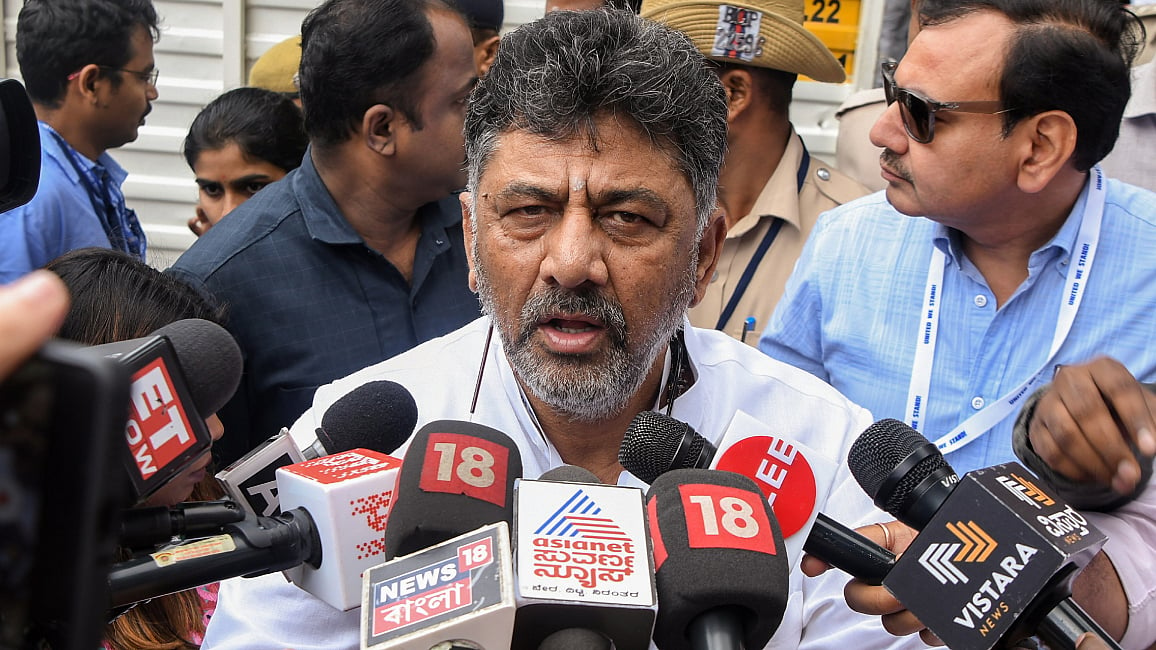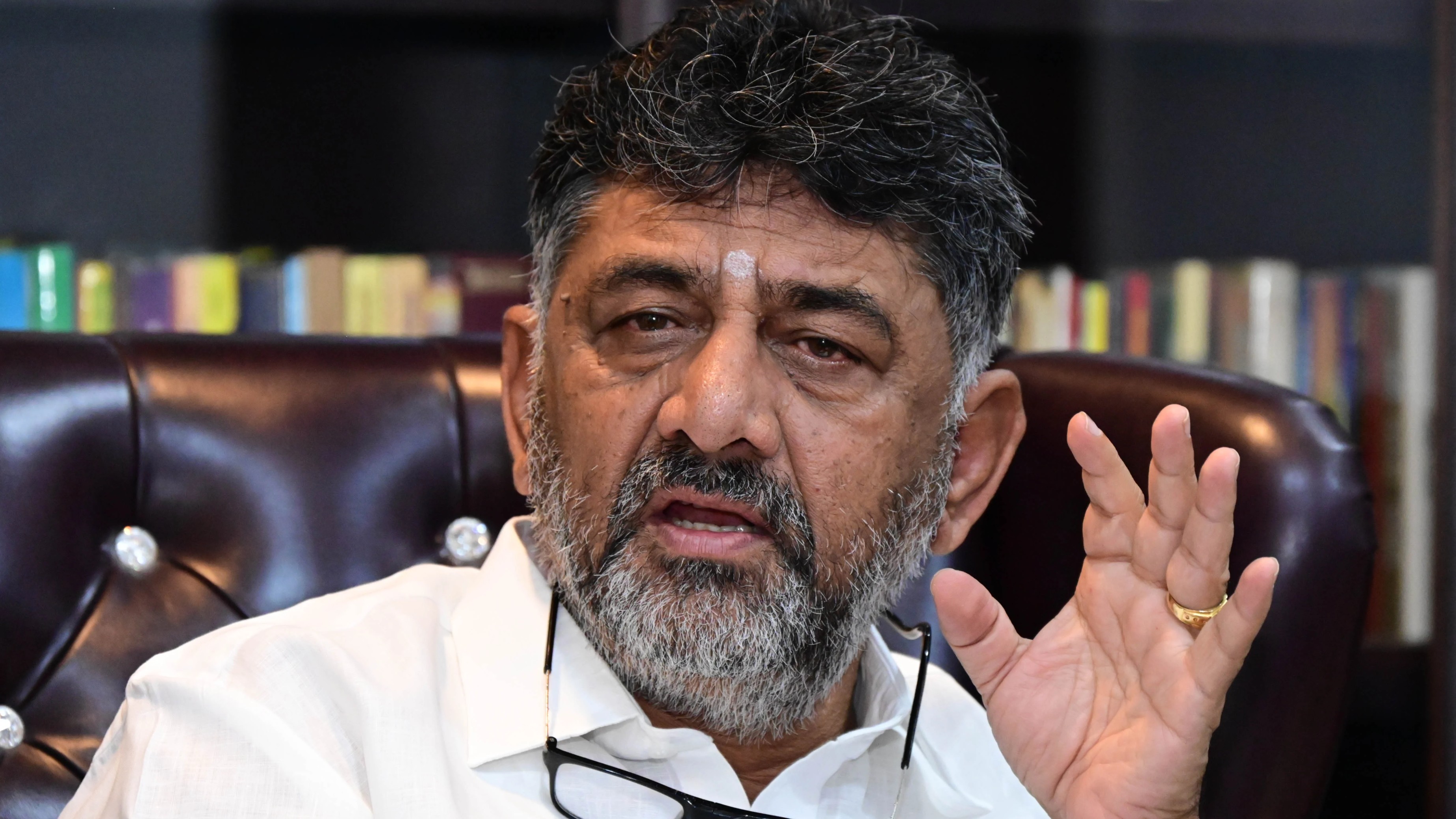Karnataka’s Deputy Chief Minister and Congress leader D. K. Shivakumar has called on the Bharatiya Janata Party (BJP) to substantiate its allegations of illicit fundraising by his party, amid heightened political tensions as Bihar prepares for its assembly elections. Shivakumar, a senior Congress strategist and key leader in Karnataka, asserted that mere accusations without evidence are “political theatrics” aimed at creating a false narrative ahead of the crucial Bihar polls. The demand for evidence comes against a backdrop of ongoing national scrutiny of political funding, with multiple parties facing allegations of unaccounted donations and campaign financing irregularities.
Shivakumar’s statement on Thursday underlined the need for transparency and accountability, emphasizing that unverified claims only serve to mislead the public and tarnish the political process. He challenged the BJP leadership to present concrete documents or records supporting its accusations, reiterating that the Congress party has consistently adhered to legal and electoral funding norms. By framing the issue as a matter of public record and accountability, Shivakumar sought to shift the conversation from partisan politics to institutional responsibility.
Backdrop of Allegations and Political Context
The BJP had recently alleged that the Congress party collected large amounts of funds in violation of electoral funding rules, asserting that such unaccounted funds could potentially influence voter behavior in upcoming elections. While the BJP did not provide immediate evidence, the claims were amplified by party spokespersons and social media platforms, creating a wave of political commentary and speculation. Analysts note that the timing of the allegations — weeks before the Bihar assembly elections — indicates an attempt to preemptively undermine the credibility of Congress leaders across multiple states.
Shivakumar, who has been actively involved in electoral strategy for the Congress, particularly in southern states, dismissed these claims as politically motivated. He pointed out that electoral funding is strictly monitored by the Election Commission of India (ECI) and that all legitimate donations are accounted for according to statutory norms. The Deputy CM also reminded political opponents that India’s legal framework provides mechanisms for investigation and verification, and that allegations without supporting evidence are liable to backfire politically.
The Bihar elections, scheduled for later this year, have intensified political maneuvering nationwide, as parties seek to establish narrative dominance and influence voter perception. Shivakumar’s demand for proof can be seen as an effort to challenge the BJP’s credibility, while simultaneously reinforcing Congress’s image as a law-abiding party. In recent months, both parties have accused each other of irregularities in various states, making the political climate increasingly charged and confrontational.
Shivakumar’s Legal and Political Position
As Karnataka Deputy CM and Finance Minister, Shivakumar is familiar with state and national funding regulations, making his rebuttal more than a rhetorical exercise. He argued that political parties must not only act within legal frameworks but also uphold moral responsibility when making public accusations. “The people deserve the truth, not hearsay and baseless claims. If the BJP has evidence, it should produce it immediately,” he stated, emphasizing that political discourse should prioritize transparency over sensationalism.
Shivakumar also highlighted the potential risks of unsubstantiated allegations in the public domain. He noted that misinformation about political funding can create unnecessary confusion among voters, potentially eroding trust in democratic institutions. By demanding documented proof, he positioned the Congress party as advocating for accountability and proper governance while casting the BJP’s claims as partisan and unverified.
Analysts suggest that Shivakumar’s approach reflects a broader strategy to protect Congress leaders from negative narratives in key election battlegrounds. Karnataka, being a politically significant state with strong party machinery, often sees its leaders’ actions scrutinized nationally. By taking a firm stance on the Bihar funding allegations, Shivakumar aims to preemptively defend the party and assert that political discourse should be grounded in verifiable facts.
Broader Implications for National Politics
The ongoing debate over political funding has wider ramifications for national politics, particularly in states like Bihar, where elections are highly competitive and voter sentiment is fluid. Allegations of unaccounted donations can influence media narratives and voter perceptions, making it imperative for parties to respond promptly and with clarity. Shivakumar’s insistence on evidence reinforces the need for accountability in political campaigns and underscores the role of the Election Commission in monitoring party funding.
Political observers also note that such exchanges between senior leaders of rival parties can serve multiple functions: they signal internal party discipline, reassure supporters, and challenge opponents’ credibility. Shivakumar’s public statements are aimed at consolidating Congress’s position while framing the BJP as relying on conjecture rather than facts. The Deputy CM’s call for transparency aligns with the broader democratic principle that accusations should be substantiated with evidence rather than speculation.
Shivakumar’s challenge to the BJP comes at a time when the political environment is increasingly polarized, and social media amplifies every claim and counterclaim. Analysts point out that public calls for proof not only pressure opponents to act responsibly but also engage voters in a debate about governance, accountability, and political ethics. By emphasizing evidence-based discussion, Shivakumar attempts to steer political narratives toward factual discourse rather than emotional or sensational reactions.

Reactions and Political Tensions
Following Shivakumar’s statements, political commentators observed a rise in public debate, with both supporters and critics weighing in on the implications of the allegations. Some BJP leaders reiterated their claims, urging investigations and legal scrutiny. However, Shivakumar’s insistence on formal documentation and procedural rigor challenges these assertions and highlights the procedural gaps in making unverified public accusations.
Congress leaders have largely supported Shivakumar’s demand, describing it as a responsible approach to political engagement. They argue that calling out unsubstantiated claims protects the integrity of the democratic process and ensures that voters receive information grounded in verifiable facts. By framing the debate as one of evidence and accountability, Congress leaders seek to differentiate themselves from what they describe as politically motivated campaigns that rely on misinformation.
Observers also note that Shivakumar’s approach may influence political strategy in other states, particularly where elections are upcoming. By setting a precedent for demanding evidence, leaders aim to deter the spread of false narratives and encourage a more disciplined political dialogue. This could lead to increased scrutiny of fundraising claims across parties and promote adherence to statutory reporting norms.
Political Strategy Ahead of Bihar Polls
The Bihar elections are critical for national parties seeking to expand their influence in eastern India. Funding allegations, if left unchallenged, could potentially sway undecided voters. Shivakumar’s insistence on proof is part of a larger strategy to neutralize political attacks before they gain traction. By publicly challenging the BJP, he not only defends Congress’s credibility but also signals vigilance and preparedness to the electorate.
Political analysts suggest that the Deputy CM’s approach combines legal awareness with electoral strategy. By demanding documented evidence, Shivakumar frames the debate within procedural norms and safeguards the party’s image. This strategy also highlights the Congress’s commitment to transparency, aiming to reassure both supporters and neutral observers of the party’s integrity.
Furthermore, the emphasis on verified information is consistent with a broader trend in Indian politics, where social media and rapid news cycles can amplify unverified claims. Shivakumar’s stance underscores the importance of responsible political communication and adherence to legal frameworks governing electoral funding. By demanding proof, he aims to ensure that political debates remain fact-driven and accountable.
Conclusion: Accountability, Transparency, and Democratic Norms
Deputy Chief Minister D. K. Shivakumar’s demand for evidence from the BJP underscores the growing importance of accountability and transparency in Indian politics. With Bihar’s elections approaching, the debate over political funding and campaign financing has intensified. Shivakumar’s insistence on verifiable documentation serves as a reminder that public accusations must be substantiated, reinforcing the principles of democratic governance.

The ongoing dialogue between the two parties highlights the interplay between legal compliance, political strategy, and public perception. As parties prepare for elections, the focus on evidence-based claims may shape not only the immediate electoral outcomes in Bihar but also broader standards of political discourse in India. By calling for proof, Shivakumar positions Congress as a party committed to procedural rigor, ethical standards, and factual accountability, challenging opponents to do the same.
Ultimately, this exchange between Karnataka’s Deputy CM and the BJP emphasizes that political debate in a democracy must balance vigorous contestation with factual integrity. For voters and citizens, the issue serves as a critical lesson: allegations, especially concerning funding, must be backed by evidence to ensure informed decision-making and uphold the credibility of democratic institutions. Shivakumar’s demand is more than a defensive political stance; it is a call for responsible politics in the lead-up to a pivotal election.
The Bihar elections will test not only party strategies but also the effectiveness of legal and institutional mechanisms in ensuring transparency in political financing. How parties respond to demands for accountability may shape public trust, influence voter sentiment, and set precedents for how allegations are addressed in future electoral contests across India.Shivakumar also emphasized that accountability is a two-way street: while parties must provide evidence when making allegations, they themselves remain open to scrutiny under the law.
He reiterated that the Congress party is prepared to cooperate fully with investigative agencies and the Election Commission, underscoring a commitment to lawful conduct. By framing the issue this way, Shivakumar reinforced the principle that political competition should not compromise ethical standards, sending a clear message that transparency and responsibility are non-negotiable in India’s democratic process.
Follow: Karnataka Government
Also read: Home | Channel 6 Network – Latest News, Breaking Updates: Politics, Business, Tech & More

